

Philosophy.uchicago.edu/faculty/files/pippin/Reginster Review.pdf. Friedrich Nietzsche. The Utter Failure of the 19th/20th Century Atheistic Icons Friedrich Nietzsche (1844 - 1900) (Printer-friendly version here - no inset articles, white background) (This is a CSS-enabled article.
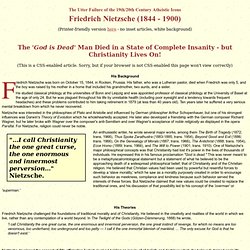
Sorry, but if your browser is not CSS-enabled this page won't view correctly) His Background Friedrich Nietzsche was born on October 15, 1844, in Rocken, Prussia. He studied classical philology at the universities of Bonn and Leipzig and was appointed professor of classical philology at the University of Basel at the age of only 24. Nietzsche was interested in the philosophies of Plato and Aristotle and influenced by German philosopher Arthur Schopenhauer, but one of his strongest influences was Darwin's Theory of Evolution which he wholeheartedly accepted. "...I call Christianity the one great curse, the one enormous and innermost perversion... " His Theories. Friedrich Nietzsche - German Philosopher. Friedrich Nietzsche (1844–1900) Nietzsche was born in Röcken, the Prussian province of Saxony, on October 15th, 1844.
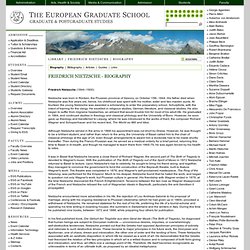
His father died when Nietzsche was five years old, hence, his childhood was spent with his mother, sister and two maiden aunts. At fourteen the young Nietzsche was awarded a scholarship to enter the preparatory school, Schulpforta, with the intent of training for the clergy. He excelled in religious studies, German literature, and classical studies. He also began to suffer from migraine headaches, an ailment that would trouble him for most of his adult life. Although Nietzsche served in the army in 1868 his appointment was cut short by illness. It was in Basel that Nietzsche became a close friend of Richard Wagner, the second part of The Birth of Tragedy is devoted to Wagner's music.
Also Sprach Zarathustra (Thus Spoke Zarathustra) was formally published first in three parts in 1883-1884 and 1892. Nietzsche, Friedrich Nietzsche was a German philosopher, essayist, and cultural critic.
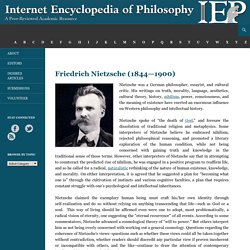
His writings on truth, morality, language, aesthetics, cultural theory, history, nihilism, power, consciousness, and the meaning of existence have exerted an enormous influence on Western philosophy and intellectual history. Nietzsche spoke of "the death of God," and foresaw the dissolution of traditional religion and metaphysics. Some interpreters of Nietzsche believe he embraced nihilism, rejected philosophical reasoning, and promoted a literary exploration of the human condition, while not being concerned with gaining truth and knowledge in the traditional sense of those terms. God is dead Friedrich Nietzsche death of God quotes. Friedrich Nietzsche is notable for having declared that God is dead and for having written several of his works in the presumption that man must find a new mode of being given the death of God.
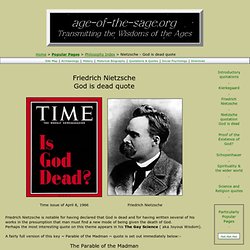
Perhaps the most interesting quote on this theme appears in his The Gay Science ( aka Joyous Wisdom). A fairly full version of this key ~ Parable of the Madman ~ quote is set out immediately below:- The Parable of the Madman Have you not heard of that madman who lit a lantern in the bright morning hours, ran to the market-place, and cried incessantly: "I am looking for God! I am looking for God! " What Nietzsche is concerned about in relating the above is that God is dead in the hearts and minds of his own generation of modern men - killed by an indifference that was itself directly related to a pronounced cultural shift away from faith and towards rationalism and science. What are we now to do? "I teach you the overman. Friedrich Nietzsche.
1.
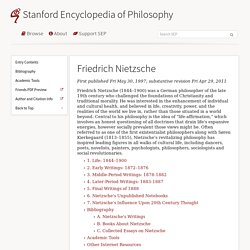
Life: 1844–1900 In the small German village of Röcken bei Lützen, located in a rural farmland area southwest of Leipzig, Friedrich Wilhelm Nietzsche was born at approximately 10:00 a.m. on October 15, 1844. The date coincided with the 49th birthday of the Prussian King, Friedrich Wilhelm IV, after whom Nietzsche was named, and who had been responsible for Nietzsche's father's appointment as Röcken's town minister.
Nietzsche's uncle and grandfathers were also Lutheran ministers, and his paternal grandfather, Friedrich August Ludwig Nietzsche (1756–1826), was further distinguished as a Protestant scholar, one of whose books (1796) affirmed the “everlasting survival of Christianity.”